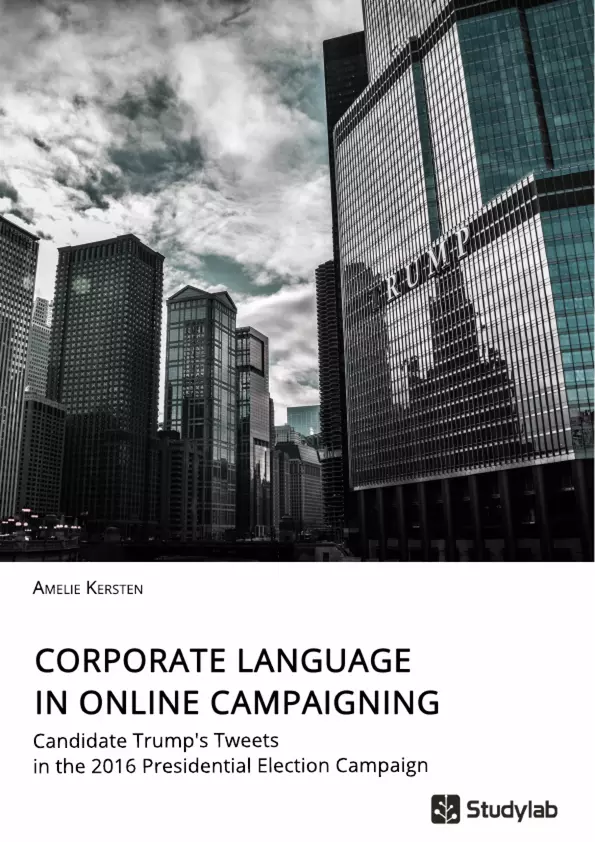
Corporate Language in Online Campaigning. Candidate Trump's Tweets in the 2016 Presidential Election Campaign
Fachbuch, 2019
89 Seiten
Leseprobe
Inhaltsverzeichnis (Table of Contents)
- Acknowledgement
- Abstract
- List of Figures
- List of Tables
- 1 Introduction
- 1.1 Aims of the thesis
- 1.2 Structure of the thesis
- 2 Political Context
- 2.1 The electoral system in the USA
- 2.2 Political Presidential Campaigning
- 2.3 Changes within Political Presidential Campaigning in thest century
- 2.4 The use of social media in Presidential Campaigning
- 2.4.1 Structure of Twitter
- 2.4.2 Criticism on Twitter in Political Campaigning
- 3 Corporate Language
- 3.1 Introduction
- 3.2 Implementation
- 3.3 Trump - A Corporate World
- 3.4 Previous Research
- 4 Methodology
- 4.1 Method of Data Collection
- 4.2 Method of Data Analysis
- 4.3 Limitations of the Study
- 5 Results
- 5.1 Presentation of Results
- 5.1.1 Quantitative Analysis
- 5.1.2 Qualitative Analysis
- 5.2 Discussion of Results
- 5.1 Presentation of Results
- 6 Conclusions and Future Work
Zielsetzung und Themenschwerpunkte (Objectives and Key Themes)
This thesis aims to explore whether Trump's preferred linguistic style within the presidential campaign was not only based on the simple marketing instrument Corporate Language but had also been created by an editorial team to frame authenticity. By using this particular style in his tweets, the former businessman convinced voters to become his follower - not only in the digital world.
- The impact of social media, particularly Twitter, on political campaigning.
- The use of Corporate Language as a linguistic strategy in political campaigning.
- The effectiveness of framing authenticity in political communication.
- The role of editorial teams in shaping political messaging.
- The influence of linguistic patterns and style on voter perception.
Zusammenfassung der Kapitel (Chapter Summaries)
Chapter 2 provides an overview of U.S. American election processes and its peculiarities. It delves into the concept of political campaigning, tracing its development from the origins to the present day, including the emergence of social media and its impact on political communication. Chapter 3 introduces Corporate Language as a marketing instrument, examining its application in brand building and customer engagement. It then explores the background of presidential candidate Trump and analyzes existing research on the use of social media in politics. Chapter 4 presents the methodology used for the content analysis of Trump's tweets, outlining the quantitative and qualitative approaches employed. It further discusses the limitations of the study. Chapter 5 presents and interprets the results of the analysis, examining both quantitative and qualitative findings. It analyzes the frequent use of specific terms, repetitive structures, and exchangeable emotional words in Trump's tweets, and explores the potential connections between these patterns and a unified Corporate Language strategy.
Schlüsselwörter (Keywords)
This study examines the use of Corporate Language in online political campaigning, specifically focusing on Donald Trump's tweets during the 2016 U.S. presidential election. It explores the relationship between linguistic patterns, social media, and political communication, examining how these elements contribute to the framing of authenticity and influence voter perception. Key concepts include Twitter, Corporate Language, social networks, political campaigning, Trump, stylometry, and sentiment analysis.
Frequently Asked Questions
What is Corporate Language in political campaigning?
It refers to a systematic linguistic style used to build a brand identity, which Donald Trump applied to his 2016 campaign to frame authenticity.
Were Donald Trump's tweets written by himself?
The research explores whether his linguistic style was created by an editorial team to maintain a specific corporate identity and image.
How did social media impact the 2016 US election?
Social media, especially Twitter, changed political participation by allowing direct communication and the rapid spread of emotionalized content.
What linguistic patterns are found in Trump's tweets?
Analysis shows frequent use of specific terms, repetitive structures, and emotional words that could be generated through reverse engineering.
What is "framing authenticity"?
It is a strategy to make a candidate appear genuine and relatable to voters through a carefully crafted but seemingly spontaneous communication style.
Details
- Titel
- Corporate Language in Online Campaigning. Candidate Trump's Tweets in the 2016 Presidential Election Campaign
- Autor
- Amelie Kersten (Autor:in)
- Erscheinungsjahr
- 2019
- Seiten
- 89
- Katalognummer
- V499466
- ISBN (eBook)
- 9783960956822
- ISBN (Buch)
- 9783960956839
- Sprache
- Englisch
- Schlagworte
- Corporate Language Linguistics Linguistik Sprachwissenschaften Trump USA Marketing Politics Politik Political Presidential Campaigning Corporate Identity Hillary Clinton Twitter Social Networks
- Produktsicherheit
- GRIN Publishing GmbH
- Preis (Ebook)
- US$ 15,99
- Preis (Book)
- US$ 26,99
- Arbeit zitieren
- Amelie Kersten (Autor:in), 2019, Corporate Language in Online Campaigning. Candidate Trump's Tweets in the 2016 Presidential Election Campaign, München, Page::Imprint:: GRINVerlagOHG, https://www.diplomarbeiten24.de/document/499466
- Autor werden
- Ihre Optionen
- Vertriebskanäle
- Premium Services
- Autorenprofil
- Textarten und Formate
- Services für Verlage, Hochschulen, Unternehmen

- © GRIN Publishing GmbH.
- Alle Inhalte urheberrechtlich geschützt. Kopieren und verbreiten untersagt.
- info@grin.com
- AGB
- Open Publishing
Der GRIN Verlag hat sich seit 1998 auf die Veröffentlichung akademischer eBooks und Bücher spezialisiert. Der GRIN Verlag steht damit als erstes Unternehmen für User Generated Quality Content. Die Verlagsseiten GRIN.com, Hausarbeiten.de und Diplomarbeiten24 bieten für Hochschullehrer, Absolventen und Studenten die ideale Plattform, wissenschaftliche Texte wie Hausarbeiten, Referate, Bachelorarbeiten, Masterarbeiten, Diplomarbeiten, Dissertationen und wissenschaftliche Aufsätze einem breiten Publikum zu präsentieren.
Kostenfreie Veröffentlichung: Hausarbeit, Bachelorarbeit, Diplomarbeit, Dissertation, Masterarbeit, Interpretation oder Referat jetzt veröffentlichen!
- GRIN Verlag GmbH
-
- Nymphenburger Str. 86
- 80636
- Munich, Deutschland
- +49 89-550559-0
- +49 89-550559-10
- info@grin.com
-









